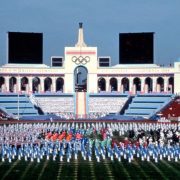In America in the 1920s and early 1930s, collegiate rowing drew some of the largest crowds of any college sport, and its top athletes were lionized by the top sportswriters of the day. In fact, premier regattas drew live national audiences via radio, and the east coast schools such as Harvard, Princeton and Navy dominated.
The two collegiate crews in the west, Berkeley and Washington, were shown little respect, even on their own campuses. Their coaches’ salaries and athletic budgets were a small fraction of those in the east. This began to change when Poetic Justice Warrior George Yeoman Pocock was lured away from building wooden pontoons for Boeing aircraft in Seattle to build boats for the University of Washington and create the Pocock Racing Shell Company on their campus:
My ambition has always been to be the best shell builder in the world, and without false modesty; I believe I have attained that goal. If I were to sell my Boeing stock, I fear that I would lose my incentive and become a wealthy man, but a second-rate artisan. I prefer to remain a first-class artisan.
The Great Depression
The prestige of rowing attracted athletes from affluent families who wanted to share in the glory. However, when the Depression hit in the 1930s, commodity-driven businesses like farming, lumber, and mining were hit especially hard. This particularly affected America’s northwest. While most of the boys who signed up for freshman crew tryouts at Washington were city kids, there were also a few from coastal towns and rural areas. They were the ones who knew long hours of physical labor, and had little or no financial resources to pay for school. The part-time campus job that came with a seat in the boat was essential.
As author Daniel Brown describes in his book The Boys in the Boat, “Competitive rowing is an undertaking of extraordinary beauty preceded by brutal punishment.” During tryouts, Pocock explains, “every good rowing coach imparts to his men the kind of self-discipline required to achieve the ultimate from heart, mind and body.” The city kids eventually gave up their dreams of rowing glory on the cover of Life or the Saturday Evening Post because of the long practices in the cold. This might partly explain why Joe Williams of the New York World-Telegram described the Washington and Berkeley crews as “coarse outlanders from the Far West.” But Pocock had a different point of view:
I believe I can speak authoritatively on what we may call the unseen values of rowing – the social, moral and spiritual values of this oldest of chronicled sports in the world. No didactic teaching will place these values in a young man’s soul.
Reason, Purpose and Pride
Pocock’s singular goal, like Poetic Justice Warrior Ayn Rand, was the pursuit of the human ideal on planet earth. He created boats that were a marvel of craftsmanship and sculpture. He transformed nature to be in harmony with it, only water and wind can slow the run of the boat. Like Jean-Baptiste Say’s producers create wealth, his individual success would be proven by the achievement of eight rowers and their coxswain. As Brown says of Pocock’s craft:
A racing shell is a machine with a narrowly defined purpose: to enable a number of large men or women, and one small one, to propel themselves over an expanse of water as quickly and efficiently as possible. Looked at another way, it is a work of art, an expression of the human spirit, with its unbounded hunger for the ideal.
In addition to the hand crafted construction – skills he learned from his father while growing up in the UK, Pocock discovered the ideal wood for his hulls while at Washington – western red cedar. Its low density, open cell structure, and tight even grain made it flexible, light, buoyant, and strong. When Washington crews first showed up at east coast regattas in the early 1920s with Pocock racing shells, the east coast elites were confident that Washington’s boats were inferior and would disadvantage their crews. But Pocock had a different perspective, “A good shell has to have life and resiliency to get in harmony with the swing of the crew.” This harmony required perfect balance, and this started with a perfectly straight 60 foot keel. A few years later Pocock was receiving orders from all over the country, emblematic of the harmony and balance of unfettered voluntary trade.
The Swing of the Crew
Pocock was part of the leadership team that was led by Washington’s head coach Al Ulbrickson and freshman coach Tom Bolles. In the spring of 1934 they found themselves with an exceptional freshman crew – the ones who grew up in lumber camps, mining towns, dairy farms and shipyards. Their physical prowess was matched by their optimism and confident affability. To them, challenges were opportunities, pain and hard work were routine, and they were grateful. Washington rowing was their opportunity for self-creation. Collectively, they could occasionally create the rhythmic synchrony called the swing of the crew, an exhilarating feeling that is the ultimate goal of all crews.
It was up to Ulbrickson, with Pocock’s inspiration, to coach them with the goal of making this synchrony routine. Part of the puzzle was to find the coxswain who knew his crew so well that he could coax this swing out of them, and at ever greater stroke ratings when needed. As Pocock explains:
Rowing a race is an art, not a frantic scramble. It must be rowed with head power as well as hand power. From the first stroke all thoughts of the other crew must be blocked out. Your thoughts must be directed to you and your own boat, always positive, never negative.
In the spring of 1936, the Washington varsity crew traveled east for the Poughkeepsie Regatta and the Princeton Olympic trials. It was a time when rowing teams competed for the right to represent the United States at the Olympics. This was also the year that Nazi Germany was the host country, and they were using the spectacle as a propaganda tool for totalitarian rule. As the Games approached, it became clear to the Washington contingent that this was more than a big race. It was the rugged individualism of a free society juxtaposed against the total control of democratic socialism.
Poetic Justice Served
When they got to Berlin, the American team discovered they were also up against the collectivism of the Olympic movement. Their performance in the preliminary heats earned them a preferred lane assignment in the Men’s Eight finals. Instead, those went to Germany and Italy. Not only was America’s outside lane exposed to the bad weather, they were cheated by the starter. Steadily the Americans fought the elements and regained water, and with 500 meters to the finish they increased the stroke rate to 38, then 40. They were closing fast, finally trading the lead with Italy, and crossed the finish line with a stroke rating of 44. Higher than they had ever rowed – higher than they had ever conceived. Washington’s crew did this flawlessly, elegantly, at full power. In rowing, that is perfection. Washington’s crew won gold for themselves, individually and collectively, with no state favors.
As Poetic Justice Warrior George Pocock explains, “Harmony, balance and rhythm. They’re the three things that stay with you your whole life. Without them, civilization is out of whack.” This is a wonderful metaphor for the life-sustaining elegance of laissez-faire Human Action.













